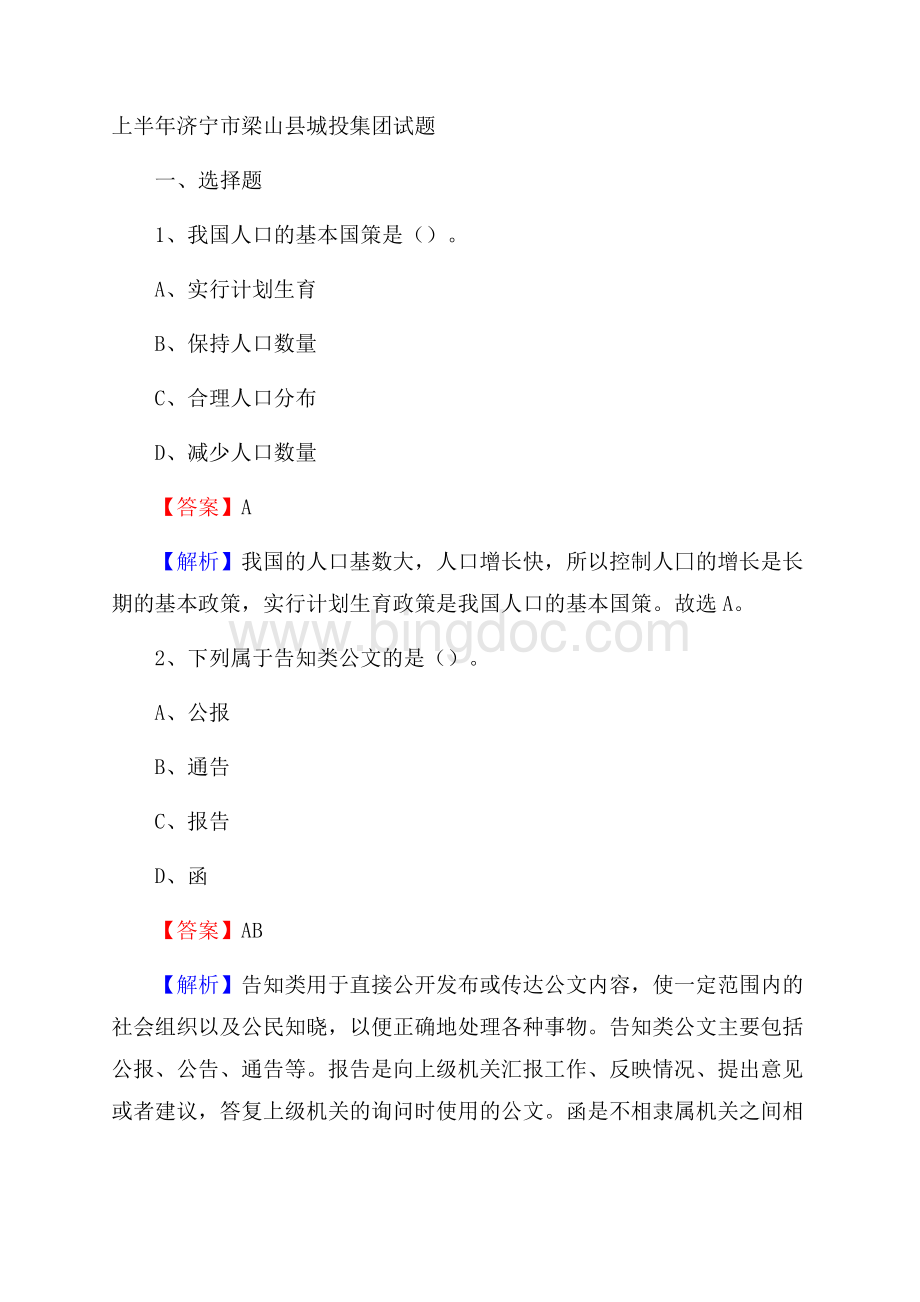 上半年济宁市梁山县城投集团试题.docx
上半年济宁市梁山县城投集团试题.docx
- 文档编号:2598539
- 上传时间:2023-05-04
- 格式:DOCX
- 页数:31
- 大小:21.94KB
上半年济宁市梁山县城投集团试题.docx
《上半年济宁市梁山县城投集团试题.docx》由会员分享,可在线阅读,更多相关《上半年济宁市梁山县城投集团试题.docx(31页珍藏版)》请在冰点文库上搜索。

上半年济宁市梁山县城投集团试题
一、选择题
1、我国人口的基本国策是()。
A、实行计划生育
B、保持人口数量
C、合理人口分布
D、减少人口数量
【答案】A
【解析】我国的人口基数大,人口增长快,所以控制人囗的增长是长期的基本政策,实行计划生育政策是我国人口的基本国策。
故选A。
2、下列属于告知类公文的是()。
A、公报
B、通告
C、报告
D、函
【答案】AB
【解析】告知类用于直接公开发布或传达公文内容,使一定范围内的社会组织以及公民知晓,以便正确地处理各种事物。
告知类公文主要包括公报、公告、通告等。
报告是向上级机关汇报工作、反映情况、提出意见或者建议,答复上级机关的询问时使用的公文。
函是不相隶属机关之间相互商洽工作、询问和答复问题,或者向有关主管部门请求批准事项时所使用的公文。
报告和函均不属于告知类公文,故正确答案为
A、B。
3、“如果集体的成员把集体的前景看作个人的前景,集体愈大,个人也就愈美,愈高尚。
”下列选项中,理解不正确的是()。
A、坚持集体利益与个人利益的统一
B、维护集体利益
C、有了集体利益就有个人利益,所以不用谈个人利益
D、正确处理集体利益和个人利益的关系
【答案】C
【解析】集体利益是个人利益的大多数的体现,与个人利益有宏观的一致性与统一性。
实现集体利益就是对个人利益的满足或为满足打下基础。
但“有了集体利益就有个人利益,所以不用谈个人利益”的说法是错误的,二者应兼顾。
故选C。
4、下面关于ROM的叙述中,错误的是()。
A、ROM中的信息只能被CPU读取
B、ROM主要用来存放计算机系统的程序和数据
C、我们不能随时对ROM改写
D、ROM一旦断电信息就会丢失
【答案】D
【解析】ROM为只读存储器,只能读出不能写入,是由厂商写入的,用户无法更改。
而RAM是随机存储器,其所存内容一旦断电就会丢失。
故选D。
5、“乱弹”是河北较有代表性的剧种之一,历史悠久,源远流长,至少比京剧要早一百年。
“乱弹”风格独特,浑朴粗犷,堪称中国戏曲的活化石。
它不仅是()人民宝贵的文化遗产,也是中国戏曲园地的一朵奇葩。
A、蔚县
B、乐亭
C、威县
D、涞源
【答案】C
【解析】
“乱弹”是河北省比较有代表性的地方剧种之一,在河北威县、山东临清一带享有盛誉,流传甚广。
它历史悠久,源远流长,风格独特,唱腔浑朴粗犷,深受广大群众的喜欢。
“乱弹”现已被列为河北省民间文化保护工程,同时被列为河北省非物质文化遗产代表作名录。
6、长沙天心阁一副对联,上联是“橘子洲,洲旁舟,舟行洲不行“下联是“天心阁,阁中鸽,鸽飞阁不飞”这形象的说明了静止是()。
A、运动的存在方式
B、运动的衡量尺度
C、运动的内在原因
D、运动的普通状态
【答案】B
【解析】舟行洲不行,鸽飞阁不飞,体现运动和静止的辩证关系。
说明静止是因参照物不同所体现出来的运动的形态,因而是运动的衡量尺度。
故选B。
7、人类社会变化发展的决定性因素是()。
A、物质资料生产方式
B、地理环境和人口条件
C、阶级斗争
D、天才人物的出现
【答案】A
【解析】生产力决定生产关系,物质资料生产方式属于生产力,因此物质资料生产方式是决定性因素。
BCD项是社会变化发展的影响因素,故排除。
故选A。
8、下列有关作品表述不准确的一项是()。
A、《天王送子图》是唐代画家阎立本所作,重视对人物神韵的把握
B、《人间喜剧》是法国19世纪批判现实主义文学作家巴尔扎克的代表作
C、中国四大古典文学名著是《三国演义》
《水浒传》
《西游记》
《红楼梦》
D、《诗经》是中国第一部诗歌总集,乃至整个中国文学的一个光辉起点
【答案】A
【解析】
《天王送子图》为唐代画家吴道子所作。
故选A。
9、乡村治理体系的“三治结合”不包括()。
A、自治
B、法治
C、人治
D、德治
【答案】C
【解析】乡村治理体系的“三治结合”指:
自治、法治、德治。
故选C。
10、资本家付给工人的工资其本质上是()。
A、工人劳动的价值
B、工人全部劳动的报酬
C、工人劳动的价格
D、工人出卖劳动力的价值或价格
【答案】D
【解析】本题考查资本。
资本家购买劳动力付给工人的工资,不是劳动的价值或价格,而是劳动力的价值或价格。
资本主义工资,其本质是劳动力价值或价格的转化形式。
故本题选择D。
11、下列属于计算机感染病毒迹象的是()
A、设备有异常现象,如显示怪字符,磁盘读不出
B、在没有操作的情况下,磁盘自动读写
C、装入程序的时间比平时长,运行异常
D、以上说法都是
【答案】D
【解析】计算机病毒是人为编制的特殊程序,这种特殊程序能够长期存在于计算机系统中,通过自我复制来传播,在一定条件下被激活并破坏计算机系统中的程序、数据和硬件或侵占系统资源。
其危害主要表现为:
产生错误显示、错误动作、计算机操作干扰、删除文件、修改数据、破坏软件系统、使硬件设备发生故障甚至损坏。
故选D。
12、私营、外资企业中劳动者的工资是()。
A、按劳分配收入
B、按生产要素分配收入
C、按经营成果分配收入
D、再分配分配收入
【答案】B
【解析】我国的个人收入分配制度是按劳分配为主、多种分配方式并存,主要是按劳分配与按生产要素分配相结合的分配方式。
按生产要素分配实现形式主要包括:
(1)按资本要素分配:
利息收入,债券、股票投资收入、房租等;
(2)按劳动力要素分配(主要存在于私营和外资企业);
(3)按智力要素分配:
技术、管理、信息、风险收入与机会收入等;
(4)按土地和其他自然资源分配:
级差地租和绝对地租。
因此
13、下列关于超级稻的说法错误的是()。
A、1980年,日本人最早提出超级稻计划,又叫水稻超高产育种计划
B、我国超级稻计划始于1996年,由袁隆平院士主持,后历经波折,于1997年才得以重启
C、2014年,我国第四期超级稻亩产突破1000公斤
D、我国第五期超级稻攻关目标拟在2016年实现
【答案】D
【解析】中国杂交水稻之父袁隆平在长沙举行的湘江论坛上透露,他的团队正在准备启动第五期超级稻攻关,目标是每公顷16吨,即每亩亩产接近1100公斤,争取在2018年实现。
D项当选。
14、在下列各组文种中,都可以用于下行文的一组是()。
A、通知、决定、请示、纪要
B、通知、命令、通报、批复
C、报告、决定、公报、条例
D、通知、决议、意见、函
【答案】B
【解析】报告适用于向上级机关汇报工作、反映情况,回复上级机关的询问。
请示适用于向上级机关请求指示、批准。
请示、报告属于上行文。
排除AC。
函属于平行文、。
排除D。
故选B。
15、一只小猪、一只绵羊和一头奶牛,被关在同一个畜栏里。
有一次,牧人捉住小猪,小猪大声嚎叫,并且猛烈地反抗起来。
绵羊和奶牛非常讨厌小猪的惨叫,说:
“他常常捉我们,我们也没有大呼小叫。
”小猪听了回答说:
“捉你们和捉我完全是两回事,他捉你们,只是要你们的毛和乳汁,但是捉住我,却是要我的命呢!
”这个故事说明()。
A、矛盾的特殊性通过普遍性表现出来
B、立场不同、所处环境不同的人,很难了解对方的感受
C、获得正确的认识意味着认识过程的结束
D、真理就是在不断的斗争中实现的
【答案】B
【解析】牧人捉绵羊是剪毛,捉乳牛是为了挤奶,它们都没有生命之危,而捉小猪是为了宰杀它,吃它的肉,那是要它的性命,这个故事告诉我们立场不同、所处环境不同的人,很难了解对方的感受,因此对别人的失意、挫折、伤痛,不要妄下论断。
故选B。
16、区分不同类型的社会形态的客观标准是()。
A、生产力的性质
B、生产关系的性质
C、经济基础的性质
D、上层建筑的性质
【答案】C
【解析】马克思主义认为,生产力和生产关系的统一是生产方式,经济基础和上层建筑的统一是社会形态,而经济基础的性质决定着上层建筑的性质。
故选C。
17、标志我国进入社会主义初级阶段的重大事件是()。
A、三大改造的完成
B、中华人民共和国成立
C、国民经济恢复任务的完成
D、中共十一届三中全会召开
【答案】A
【解析】A项正确:
三大改造的完成。
B项错误:
1949年中华人民共和国成立,进入新民主主义社会。
C项错误:
1949年-1952年完成,1953年就开始改造。
D项错误:
1978年改革开放。
故选A。
18、人们都追求并期盼得到幸福,但美好愿景的实现是要经历风雨甚至痛苦的,这其中蕴含的哲学道理是()。
A、事物发展的道路总是曲折的
B、事物发展是前进性和曲折性的统一
C、实践是检验真理的唯一标准
D、发展就是新事物战胜旧事物的过程
【答案】B
【解析】发展是揭示事物运动、变化的整体趋势和方向性的范畴,发展是具有前进性质的运动,是事物由低级向高级、由简单向复杂、由无序向有序的上升的运动。
事物的发展是前进性和曲折性的统一。
题干中“幸福”和“美好愿景”说明事物的发展是前进性的,“经历风雨甚至痛苦”则说明事物的发展是曲折性的。
B项正确。
故选B。
19、吸烟有害健康,其原因是吸烟时会产生多种有害物质,污染环境,害人害己。
香烟燃烧产生的烟气中,最容易与人体血红蛋白结合的物质是()。
A、尼古丁
B、二氧化硫
C、一氧化碳
D、二氧化碳
【答案】C
【解析】香烟燃烧能生成二氧化碳、一氧化碳、尼古丁、烟焦油等物质。
其中,一氧化碳极易与血红蛋白结合,一氧化碳与血红蛋白结合的能力大约是氧气的200倍。
C项正确。
20、春节前后,某市羊肉价格是每千克37元,西红柿价格虽比平时上涨,但也只有每千克10元,羊肉之所以比西红柿贵,主要是因为()。
A、买西红柿的人更多
B、羊肉营养价值高于西红柿
C、羊肉价值量大
D、羊肉比西红柿的需求量大
【答案】C
【解析】春节间,虽然西红柿涨价,可是再涨也不会高过羊肉的价格,是因为商品的价格是由价值决定,供求只是起影响的作用,商品价值的大小又叫做价值量。
故选C。
21、2台电冰箱可以换取1台空调,这主要是因为()。
A、电冰箱和空调都是由人生产出来的
B、电冰箱和空调的效用中有相同的部分
C、电冰箱和空调这两种商品有不同的使用价值
D、电冰箱和空调这两种商品中都凝结了一般人类劳动
【答案】D
【解析】两种不同的商品可以按一定比例互相交换是因为在生产中都凝结了一般人类劳动。
故选D。
22、请示具有要求上级机关答复批准工作,要得到上级机关给予理想批复,写好()是关键。
A、请示标题
B、请示缘由
C、请示事项
D、结束语
【答案】B
【解析】本题考查的是15种公文格式。
在实践中,写好请示的缘由部分,往往是求得上级机关给予理想批复的关键,所以请示缘由部分往往比其他公文的缘由部分更为详细。
故本题选B。
23、函是法定的文种之一,理解函的定义的关键是要准确理解()的意义。
A、请求批示
B、答复审批
C、商洽
D、不相隶属机关
【答案】D
【解析】函适用于不相隶属机关(级别相同但不相隶属)之间商洽工作、询问和答复问题、请求批准和答复审批事项,理解函的定义的关键是把握函的适用范围,即理解“不相隶属机关”的意义。
故选D。
24、以资本成本的计算与应用价值看,资本成本属于()。
A、机会成本
B、沉没成本
C、实际成本
D、计划成本
【答案】A
【解析】资本成本就是机会成本。
沉没成本是指不受决策中各种选择影响的成本。
故选A。
25、关于中餐礼仪,不正确的是()。
A、在席间说话时,不要把筷子当道具,随意乱舞
B、喝酒时。
一味给不胜酒力的人劝酒、灌酒,是失礼的表现
C、按礼仪惯例,面对正门者是上座,背对正门者是下座
D、够不到的菜,可随意起身或离席去取
【答案】D
【解析】D项不符合就餐礼节,正确的是如果多人入席,桌子很大,又不能旋转,菜离你比较远,最好不要站起来将胳膊伸到对方面前去夹食。
相反,如果自己身边的菜别人够不着,应站起来帮助对方,这样既符合礼节。
又显得亲切。
故选D。
26、人生观的核心是()。
A、人生目的
B、人生价值
C、人生态度
D、人生理想
【答案】A
【解析】人生目的是人生观的核心,它贯穿人生历程的始终,持续激励和引导着个人不断前行。
故选A。
27、某城市空气质量较差,检测结果显示,在主要污染物中,PM颗粒浓度严重超标,PM颗粒浓度及有害气体浓度尚在正常范围。
如果你是城市决策者,采取以下哪些措施能在影响最小的情况下,最有效地改善空气质量()。
①整改郊区水泥厂②整改郊区造纸厂③市区车辆限号行驶④改善郊区植被环境
A、①②
B、①④
C、③④
D、②③
【答案】B
【解析】PM指环境空气中小于等于
2.5微米的颗粒物,也称细颗粒物、可入肺颗粒物,能较长时间悬浮于空气中。
PM是环境空气中小于等于10微米的可吸入颗粒物,指漂浮在空气中的固态和液态颗粒物的总称,PM包含PM。
该城市空气质量差的原因是PM浓度严重超标,PM颗粒浓度及有害气体浓度尚在正常范围,所以改善空气质量最有效的方式是减少PM的排放量,即主要减少固态颗粒排放量。
①水泥厂的污染物肯定会涉及一些固态颗粒物污染,所以应该整改。
②造纸厂主要的污染是废气废水污染,产生的粉尘固态颗粒污染物并不多,因此整改郊区造纸厂并不能最有效的改善空气质量,②不选。
③车辆的尾气排放主要包括一氧化碳、氮氧化物、碳氢化合物和固体悬浮颗粒等,影响的也是PM,③不选。
④郊区植被环境会影响城市的环流,影响粉尘的流动。
所以①④能最有效的改善空气质量。
B项正确,当选。
28、()是发展中国特色社会主义的强大动力。
A、科学发展
B、改革开放
C、社会和谐
D、解放思想
【答案】B
【解析】解放思想是发展中国特色社会主义的一大法宝,改革开放是发展中国特色社会主义的强大动力,科学发展、社会和谐是发展中国特色社会主义的基本要求。
故选B。
29、下列关于我国传统节日的描述,与古代的说法或传说不相符的是()。
A、元宵节挂红最早跟佛教仪式有关联
B、清明节吃寒食最早是为了纪念一位先皇
C、中秋节吃月饼曾与反抗元朝的统治有关
D、古代的春节叫元旦,意为一年的第一天
【答案】B
【解析】冬至后一百零五天谓之寒食。
从前这天禁火,冷食,故又称“冷节”、“禁烟节”。
民间传说寒食是为了纪念春秋时的介子推被火焚于绵山。
晋文公下令禁火。
介子推是山西人.所以冷食习俗在山西首先流行。
旧时寒食断火,次日宫中有钻木取新火的仪式.民间也多以柳条互相乞取新火。
故本题答案为B。
30、“静者静动,非不动也。
静中含动,动不舍静。
”下列观点与此论断体现的哲学道理,最契合的是()。
A、静止是有条件的、暂时的和相对的
B、事物是绝对运动与相对静止的统一
C、运动是物质的根本属性和存在方式
D、运动是无条件的、永恒的和绝对的
【答案】B
【解析】
“静者静动,非不动也,静中含动,动不舍静”,该观点正确的认识到了绝对运动与相对静止的关系,即事物是绝对运动与相对静止的统一。
故选B。
31、剩余价值和利润不能直接等同的原因在于,剩余价值是相对于()而言的。
A、全部预付资本
B、不变资本
C、可变资本
D、平均成本
【答案】C
【解析】资本在价值形式上区分为不变资本与可变资本。
在资本主义生产过程中,资本家的预付资本一部分以生产资料的形式存在,这部分资本在生产过程中不改变自己的价值量,只是转移到了新产品中,所以叫做不变资本;另一部分以劳动力的形式存在,劳动力在生产过程中发挥作用的结果,不仅再生产出劳动力的价值,而且还生产出剩余价值,即这部分资本在生产过程中发生了价值增值,就叫做可变资本。
故选C。
32、真理与谬误的区别在于()。
A、真理是绝对的,谬误是相对的
B、真理是不变的,谬误是可变的
C、真理是对事物的正确反映,谬误是对事物的歪曲反映
D、真理是对外部世界的反映,谬误是主观自生的
【答案】C
【解析】人的认识有真理,也有谬误。
谬误是人对客观事物及其规律的歪曲反映。
真理和谬误是相对立而存在、相斗争而发展的。
真理和谬误的根本区别为:
与客观实际是否相符合、相一致。
凡是与客观实际相符合、相一致的认识,就是真理。
凡是与客观实际相违背、不一致的认识,就是谬误。
故选C。
33、有一种观点认为,社会生活的变迁、社会的发展是由人的愿望、目的、动机决定的。
还有一种观点认为,神灵天意决定社会的变化和人间的祸福。
从哲学上看,上述两种观点的共同点是()。
A、都承认社会的发展有其自身发展的规律
B、都肯定了物质资料生产方式是人类社会发展的决定力量
C、都肯定了世界的本质是物质
D、都否认了社会存在与发展的客观性
【答案】D
【解析】题目中所说的两种观点都属于唯心主义历史观,前者是主观唯心主义,后者是客观唯心主义。
不管是主观唯心主义还是客观唯心主义,都否认世界的本原是物质的,同时也就否定了物
34、评价职业生涯的某个阶段是否成功,必须综合考虑()因素。
A、个人、家庭
B、企业、社会
C、个人、家庭、企业
D、个人、家庭、企业、社会
【答案】D
【解析】每个人都生活在特定环境中,既有个人、家庭、企业的小环境,也有社会历史的大环境。
评价某一个人的职业生涯的某个阶段是否成功,必须综合考虑个人、家庭、企业、社会等多方面因素。
只有通过多方面的考察,才能得出全面的结论和准确的结果。
故选D。
35、社会存在属于社会生活的物质方面,是社会实践和物质生活各种条件的总和,它是()。
A、生产方式、地理环境和人口因素的统一
B、生产力和生产关系的统一
C、生产方式和社会形态的统一
D、经济基础和上层建筑的统一
【答案】A
【解析】社会存在和社会意识的关系问题是历史观的基本问题。
社会存在最本质的方面是物质资料生产方式。
把物质资料生产方式规定为社会存在的本质内容就已经把自然环境和人口因素部分地包含在内。
进入生产过程中的人是劳动者,劳动者在生产中形成的人与人之间的关系就是生产关系,生产力和生产关系的统一构成了生产方式。
因此,社会存在是生产方式、地理环境和人口因素的统一。
36、社会的货币化程度,是指()。
A、金融资产总额与实物资产总额的比重
B、GNP中货币交易总值所占的比例
C、一定时期内社会金融活动总量与经济活动总量的比值
D、各经济部门拥有的金融资产与负债的总额
【答案】B
【解析】社会的货币化程度又称货币化率,是指一定经济范围内通过货币进行商品与劳务交换的价值占国民生产总值的比重。
故选B。
37、为了尽快清除因大雪造成的道路积雪,常用的办法是撒“融雪盐”,其原理是()。
A、“融雪盐”与少量水发生化学反应,产生的热量使周围的冰雪融化
B、“融雪盐”产生“保暖层”,使冰雪吸收足够的“地热”而融化
C、使雪形成“含融雪盐的雪”熔点低于当地温度,使雪融化
D、“融雪盐”有利于冰雪对阳光的吸收,从而加快冰雪的融化
【答案】C
【解析】氯盐类融雪剂溶于水(雪)后,溶液的冰点下降,都在零度以下。
如氯化钠溶于水后冰点在-10℃,氯化钙在-20℃左右,醋酸盐类可达-30℃左右。
盐的溶解使含盐雪水的凝固点降低,因此在雪水中溶解了盐之后就难以再形成冰块。
其原因是,融雪剂溶于水后,水中离子浓度增大,使水的液相蒸气压下降,但冰的固态蒸气压不变。
达到冰水混合物平衡共存时固液相蒸气压相等的状态,冰便融化。
故洒上融雪剂可以除冰雪。
故选C。
38、微机硬件系统中最核心的部件是()。
A、内存储器
B、输入输出设备
C、CPU
D、硬盘
【答案】C
【解析】CPU包括运算器控制器,是计算机的核心部件。
故选C。
39、下列批办意见不恰当的是()。
A、拟同意
B、同意,请XX科承办
C、请XX同志阅处
D、阅
【答案】AD
【解析】批办不能只阅不批,或是只批“拟同意”或“阅”之类模棱两可文字,必须提出具体可行的批办意见,提出如何具体组织解决公文中提到的问题。
所以答案选AD。
40、我国的著作权包括著作人身权和著作财产权。
著作人身权指作者对自己的作品依法享有的以人身权益为内容的权利。
它不包括()。
A、发表权
B、署名权
C、再现作品获得报酬权
D、保护作品完整权
【答案】C
【解析】著作人身权包括发表权、署名权、修改权、保护作品完整权四项权利,
A、B、D三项正确。
C项属于著作财产权,当选。
41、我国少数民族最多的省份是()。
A、四川
B、云南
C、西藏
D、甘肃
【答案】B
【解析】云南是我国少数民族最多的省份。
故选B。
42、每一个复杂的生物个体都是由各种不同的细胞构成的系统,其中每个细胞中的DNA都包含了该生物个体所有性状的遗传信息。
这段话蕴涵的哲理有()。
A、整体和部分是相互渗透的
B、整体和部分在一定条件下相互转化
C、整体等于部分之和
D、整体具有部分所不具有的特性
【答案】ABD
【解析】四个选项中,
A、B、D体现了整体和部分的辩证法,应予以选择。
整体不“等于”各部分的“总和”,而是各部分的有机统一,所以选项C应予以排除。
43、某部门负责人被上级领导批评为“控制的太多,而领导的太少。
”他在工作中存在的主要问题最可能是()。
下级的生活困难缺乏足够的关心
B、对工作任务的完成没有充分的关注
C、事无巨细,事必躬亲
D、没有和下级进行有效沟通
【答案】C
【解析】
“控制的太多,而领导的太少”是说这位负责人不敢放手让下面的员工去做,C项是正确答案。
故选C。
44、一般情况下,当黄河流域进入雨季时,长江中下游地区可能出现的地理现象是()。
A、油菜花黄蜜蜂忙
B、阴雨绵绵梅子黄
C、稻田受旱暑骄阳
D、落叶遍地秋风狂
【答案】C
【解析】当我国雨带推移到黄河流域时,长江中下游地区已过了梅雨季节,受副热带高压控制,正值伏旱天气。
故选C。
45、我国建立基本医疗卫生制度的目标是()。
A、形成和完善公共卫生和医疗服务体系
B、人人享有基本医疗卫生服务
C、为群众提供安全、有效的医疗卫生服务
D、不断提高全民健康水平
【答案】B
【解析】
- 配套讲稿:
如PPT文件的首页显示word图标,表示该PPT已包含配套word讲稿。双击word图标可打开word文档。
- 特殊限制:
部分文档作品中含有的国旗、国徽等图片,仅作为作品整体效果示例展示,禁止商用。设计者仅对作品中独创性部分享有著作权。
- 关 键 词:
- 上半年 济宁市 梁山 县城 集团 试题
 冰点文库所有资源均是用户自行上传分享,仅供网友学习交流,未经上传用户书面授权,请勿作他用。
冰点文库所有资源均是用户自行上传分享,仅供网友学习交流,未经上传用户书面授权,请勿作他用。
文档标签
- 山东济宁梁山县县
- 上半年宁波市象山县城
- 上半年山东省济宁市梁山县
- 山东省济宁市梁山县上半年
- 上半年南宁市横县集团
- 上半年宣城市宁国市集团
- 上半年运城市永济市集团
- 上半年济宁市兖州区城投
- 上半年济宁市泗水县城
- 上半年济宁市邹城市集团
- 上半年济宁市金乡县城
- 上半年黄山市歙县集团
- 上半年济宁市城区集团
- 上半年济南市济阳县城
- 下半年山东省济宁市梁山县
- 上半年济宁市梁山县城
- 上半年济宁市鱼台县城
- 上半年黄山市休宁县城
- 广东省中山市永宁中学
- 济宁中考化学试题
- 中考复习山东省济宁市
- 中考山东省济宁市化学
- 山东省济宁市梁山一中
- 山东省梁山县第一中学
- 山东省济宁市梁山县第一
- 山东省济宁市梁山县第一
- 山东省济宁市学年第一
- 山东省济宁市中考化学试题


 关于人生励志作文汇总七篇精选.docx
关于人生励志作文汇总七篇精选.docx
